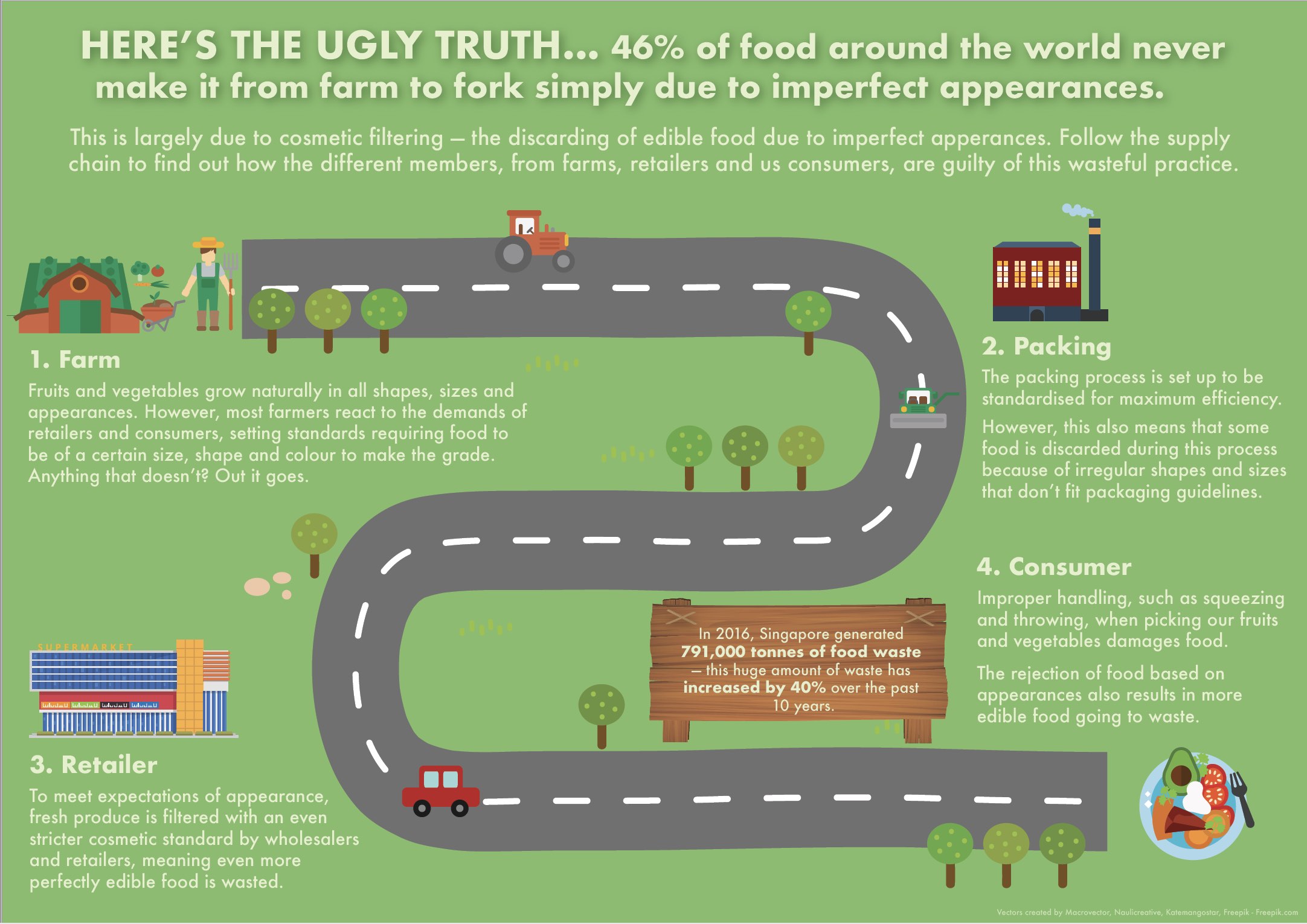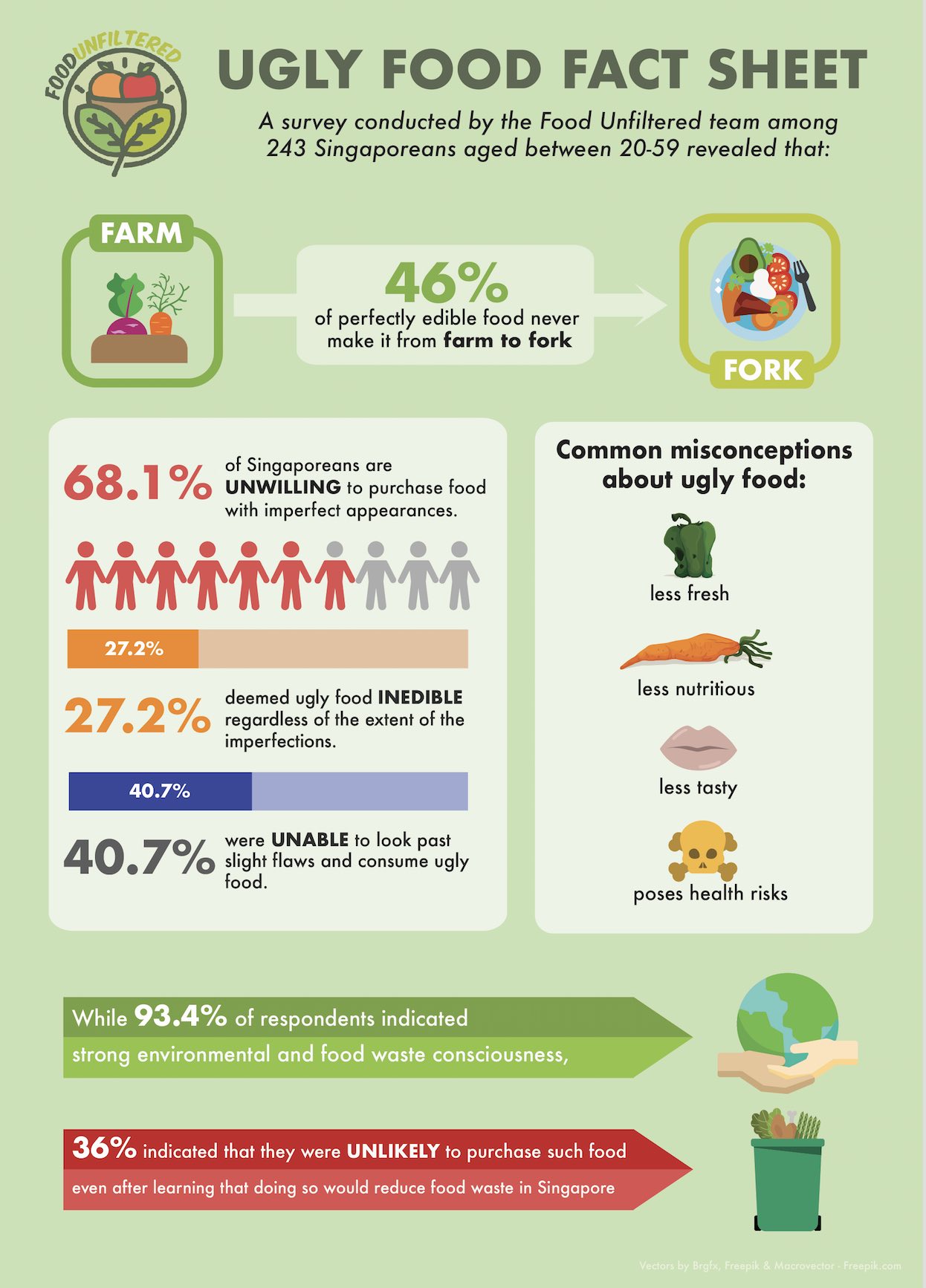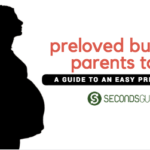Published 18 March 2018 ● Last Updated on 29 July 2020
Our guest writer today is Jerlin Huang, 24, a final-year student from Nanyang Technological University’s Wee Kim Wee School of Communication (WKWSCI) and a warrior against food waste. As team member of Food Unfiltered [Facebook / Instagram], she is involved in the recently launched communications campaign to encourage Singaporeans to stop filtering out ‘Ugly Food’. Jerlin believes that every person can play a part in reducing food waste – no matter how small – in order to help save the environment. The Food Unfiltered Team initiated this campaign as part of their Final Year Project to tackle the issue of cosmetic filtering, a lesser known and rarely addressed cause of food waste in Singapore.
Did you know that 2 out of 3 Singaporeans admit to rejecting food because of imperfect appearance?
A recent survey conducted among 243 Singaporeans aged between 20 and 59 showed that consumer misperceptions of ‘ugly food’ has played no small part in contributing to the growing food waste problem in Singapore. This survey was carried out as part of the ‘Food Unfiltered’ campaign started by me and my three other team members from WKWSCI – Ernest Chin, 25, Yasira Yusoff, 23 and Aravind Manogaran, 25. Motivated by our desire to make a meaningful impact for the environment, we started the campaign to educate Singaporeans on how their ingrained grocery shopping habits could give rise to major food wastage.
Cosmetic filtering, or the discarding of edible food due to less-than-perfect appearances, has been recognised as a significant contributor to food waste. In fact, 46% of food produced worldwide fails to make it from farm to fork due to imperfect appearances. And unfortunately, it seems Singapore isn’t so different from the rest of the world.

Even though 9 out of 10 respondents indicated strong environment and food waste consciousness, 3 out of 10 still indicated they were unlikely to purchase ugly food, even if doing so would help to reduce food waste! Are you amongst them? Do you want to play a part in reducing food waste caused by cosmetic filtering?
#1 Give ugly food a chance.
As Lin Ruiwen, Executive Director of Sheng Siong Group, said, “(it) is natural that not all fresh produce are perfect looking, but small blemishes can definitely be tolerated.” Ugly food might be off-putting at first glance but if you pick them up and cut them open, you’ll discover that they’re no different on the inside from their perfect-looking counterparts.
#2 Transform ugly food by removing the undesired portions and turning them into a beautiful dish.
Fahimah Mohd Jahar, Saladstop!’s Nutritionist said in one of our interviews with her, “Nutrition is not skin deep.” Surface blemishes can easily be removed by skinning or slicing. To educate consumers more on this issue, Food Unfiltered has also launched a video series titled Ugly Food: Fact Checked. Check out the video below on why buying blemished bananas may actually be better for your banana bread recipe! Other bruised or oddly-shaped vegetables can easily be turned into delicious soups. [More videos here.]
Ever wondered why people use overripe or 'ugly' bananas for banana bread? Find out what lies beneath the discoloured spots in the second part of Ugly Food: Fact Checked.
Posted by Food Unfiltered on Tuesday, February 27, 2018
#3 Be gentle when handling fruits and vegetables.
Grocery shoppers should take special care not to poke or squeeze food with too much force when buying them – for this might lead to bruising and damage, and in turn, reduce the chances of them being sold.
Still wondering why should you join our Ugly Food movement? Far from just the wastage of perfectly edible food, the disposal also causes a significant environmental toll, as farming resources such as water, fertilizer, pesticides, seeds, fuel, and the land needed to grow the produce all end up being used in vain. Given the current rate of waste disposal, Singapore will now require a new landfill every 35 years.
That’s why, in the Year of Climate Action, our team has made a resolution to educate Singaporeans on how they can make a tangible impact on our nation’s food sustainability and waste management with a simple change in mindset.
Starting this month, we have partnered with the Sheng Siong Group to feature posters in their supermarkets to raise both consumer awareness and consciousness about their everyday grocery shopping habits. In addition, we have also gone down on food rescue trips to Pasir Panjang Wholesale Centre along with Food Bank Singapore. The experience was a huge eye-opener as to how much food suppliers throw out, even before being subjected to consumer bias. Our team has also worked with Southwest CDC, Taman Jurong Community Club, Saladstop! and NTU’s Student Community Engagement Office, who supported the campaign in carrying out various events and initiatives to spread the message nationwide in different ways. We are also very grateful to have received support from the National Youth Council’s Young ChangeMakers grant, as well as the National Environment Agency.
With the nation’s limited amount of land, Food Unfiltered hopes that this campaign, held in conjunction with the Year of Climate Action, will inspire every Singaporean to jump on the sustainability movement in order to ensure that future generations will be able to enjoy the same benefits as the current one.




0 Comments